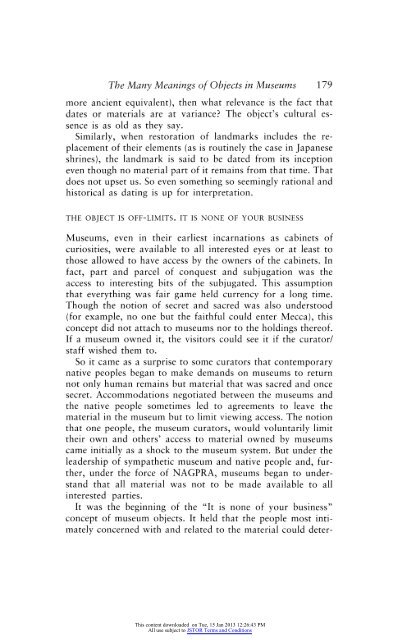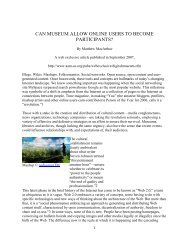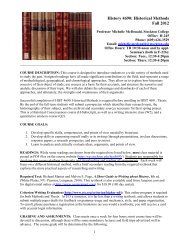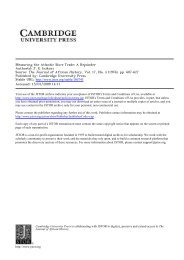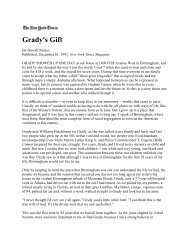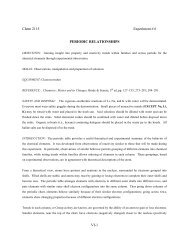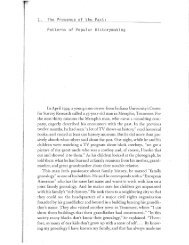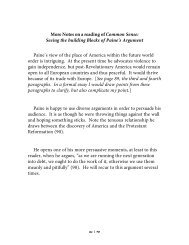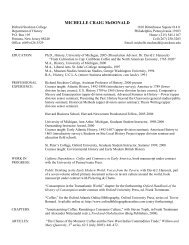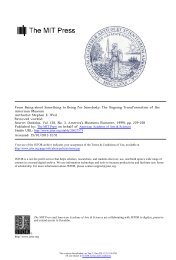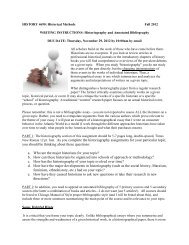What Is the Object of This Exercise? A Meandering Exploration of ...
What Is the Object of This Exercise? A Meandering Exploration of ...
What Is the Object of This Exercise? A Meandering Exploration of ...
Create successful ePaper yourself
Turn your PDF publications into a flip-book with our unique Google optimized e-Paper software.
The Many Meanings <strong>of</strong> <strong>Object</strong>s in Museums 179<br />
more ancient equivalent), <strong>the</strong>n what relevance is <strong>the</strong> fact that<br />
dates or materials are at variance? The object's cultural es<br />
sence is as old as<br />
<strong>the</strong>y say.<br />
Similarly, when restoration <strong>of</strong> landmarks includes <strong>the</strong> re<br />
placement <strong>of</strong> <strong>the</strong>ir elements (as is routinely <strong>the</strong> case in Japanese<br />
shrines), <strong>the</strong> landmark is said to be dated from its inception<br />
even<br />
though<br />
no material part <strong>of</strong> it remains from that time. That<br />
does not upset<br />
us. So even<br />
something<br />
so<br />
seemingly rational and<br />
historical as<br />
dating is up for interpretation.<br />
THE OBJECT IS OFF-LIMITS. IT IS NONE OF YOUR BUSINESS<br />
Museums, even in <strong>the</strong>ir earliest incarnations as cabinets <strong>of</strong><br />
curiosities, were available to all interested eyes or at least to<br />
those allowed to have access<br />
by <strong>the</strong> owners <strong>of</strong> <strong>the</strong> cabinets. In<br />
fact, part and parcel <strong>of</strong> conquest and subjugation<br />
was <strong>the</strong><br />
access to<br />
interesting bits <strong>of</strong> <strong>the</strong> subjugated.<br />
<strong>This</strong> assumption<br />
that everything<br />
was fair game held currency for a<br />
long time.<br />
Though <strong>the</strong> notion <strong>of</strong> secret and sacred was also understood<br />
(for example,<br />
no one but <strong>the</strong> faithful could enter Mecca), this<br />
concept did not attach to museums nor to <strong>the</strong> holdings <strong>the</strong>re<strong>of</strong>.<br />
If a museum owned it, <strong>the</strong> visitors could see it if <strong>the</strong> curator/<br />
staff wished <strong>the</strong>m to.<br />
So it came as a<br />
surprise<br />
to some curators that contemporary<br />
native peoples began<br />
to make demands on museums to return<br />
not<br />
only human remains but material that was sacred and once<br />
secret. Accommodations negotiated between <strong>the</strong> museums and<br />
<strong>the</strong> native people sometimes led to agreements to leave <strong>the</strong><br />
material in <strong>the</strong> museum but to limit viewing<br />
access. The notion<br />
that one<br />
people, <strong>the</strong> museum curators, would voluntarily limit<br />
<strong>the</strong>ir own and o<strong>the</strong>rs' access to material owned by museums<br />
came<br />
initially<br />
as a shock to <strong>the</strong> museum system. But under <strong>the</strong><br />
leadership <strong>of</strong> sympa<strong>the</strong>tic<br />
museum and native people and, fur<br />
<strong>the</strong>r, under <strong>the</strong> force <strong>of</strong> NAGPRA, museums<br />
began<br />
to under<br />
stand that all material was not to be made available to all<br />
interested parties.<br />
It was <strong>the</strong> beginning <strong>of</strong> <strong>the</strong> "It is none <strong>of</strong> your business"<br />
concept<br />
<strong>of</strong> museum<br />
objects. It held that <strong>the</strong> people most inti<br />
mately concerned with and related to <strong>the</strong> material could deter<br />
<strong>This</strong> content downloaded on Tue, 15 Jan 2013 12:26:43 PM<br />
All use subject to JSTOR Terms and Conditions


